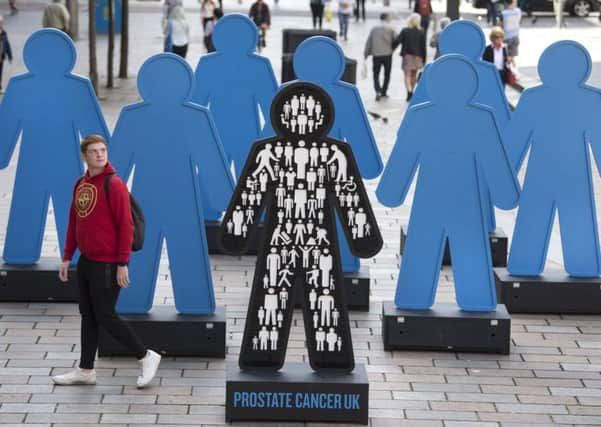Steve Cardownie: Men '“ get a prostate test before it's too late


It was when I was having a routine blood test at my doctor’s surgery that I asked about my PSA (prostate-specific antigen) reading as a friend of mine, who was diagnosed with prostate cancer, had advised me to do.
The blood test, which measures the level of PSA in a man’s blood, was sent to the laboratory for analysis and a level of 9.1 was detected. As 4.0 would be the norm and mine was considerably higher than that I was referred to the Western General Hospital for a biopsy which confirmed that I indeed had prostate cancer. I was then invited to consider the form of treatment that I determined would be best for me. I should point out that I did not display any symptoms whatsoever and had I not asked for a PSA level would have been blissfully unaware to this day that anything was amiss.
Advertisement
Hide AdAdvertisement
Hide AdAlthough I had never been offered an exam by a GP, I am aware that far too many men feel embarrassed at the prospect and do not to ask for one, potentially putting their lives at risk.
However, the guidance issued to GPs allows men aged 40-plus the right to have their PSA levels analysed if, after talking it over with the doctor, they choose to exercise that right. I now had to discuss with medical practitioners the treatments on offer and conduct some methodical research on the internet before deciding which was best for me.
I was put in touch with the Edinburgh and Lothian Prostate Cancer Support Group (you can call them on 07933 260066 or email [email protected]) where I spoke to a couple of people who had already had treatment, allowing me to get first-hand testimony about processes and potential side-effects which proved invaluable.
The week before last I attended the Western General Hospital to undergo the treatment that I had plumped for – brachytherapy. This is a form of radiotherapy where a sealed radiation source is placed inside or next to the area requiring treatment which for me entailed the placing of 90 radioactive seeds in my prostate which over a matter of time are expected to kill off the tumour. They die off themselves and are left where they are as they do not cause any harm.
Advertisement
Hide AdAdvertisement
Hide AdSo there I was dressed in my goony and ready to go and after several meetings with the extremely helpful staff who were set to carry out the operation I was wheeled into the theatre and knocked out cold for two hours by the anaesthetist (I could have done with him at Tynecastle Park last Saturday) and later awoke as I was being transferred to the recovery room.
The whole process was painless and carried out with the utmost care and understanding by the staff, who displayed a level of professionalism second to none and to whom I will be eternally grateful.
The purpose of this piece is not to bore the reader senseless with accounts of my experience – and if I have done so please forgive me – but to reinforce my plea to readers to consider taking such a test themselves or to implore a relative or friend who falls into the 40-plus male category to do so. After being diagnosed with prostate cancer and undergoing treatment all I have to do now is sit and wait for a successful outcome – which is a damn sight better than to sit and wait for the Grim Reaper to come knocking at my door.